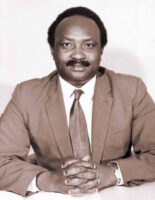
The terse one o’clock announcement by the Presidential Press Unit of the sacking of Robert Stanley Matano as Minister for Information and Broadcasting in 1985 hit the Kanu secretary-general like a thunderbolt.
Matano, who was en route from his Mazeras home in Coast Province by train, disembarked in Nairobi and called his office, seeking a vehicle to transport his personal effects from the Government house he occupied.
He had served both Kenyatta and Moi in various Cabinet portfolios — Culture, Social Services and Housing, Cooperative Development and Information and Broadcasting. When he was sacked, he quietly marked time until he lost his parliamentary seat in 1988 and retired to a life of farming at his rural home.
Matano was born in Mazeras, Kaloleni, in 1925 and tended his father’s livestock and helped in the farm. He started school at Mazeras Intermediate, and then joined the Church Missionary Society School in Kaloleni. He passed well and was admitted to Kaaga Secondary School, Meru, and later Alliance in 1936. He was a hardworking and disciplined student. Then in 1946, he joined Makerere College for a diploma course in education, graduating in 1948. In 1949, he started his teaching career at Ribe Boys Junior Secondary School and later Alliance. He was promoted to District Education Officer (DEO) in Mombasa and Kwale.
In politics, Matano was drawn to the side advocating a majimbo system as opposed to Kanu’s unitary preference. Matano joined politics in the 1960s at the prodding of Ronald Ngala.
He was in the Lancaster delegation of 1960, 1961 and 1962. Kanu won the 1963 elections and formed the independence government and Kadu went into the opposition. But in 1964, the party was dissolved and the members, including Matano, who had been elected the MP for Kinango, crossed the floor and joined the ruling party.
As MP and minister, Matano’s sense of high integrity, made other party members regard him as politically naïve. But his political star started rising when he was thrust into Kanu with Mboya as the secretary-general. After Mboya’s assassination in 1969, President Kenyatta appointed Matano acting Kanu secretary-general. But the party was not as active as it had been. After the 1966 Limuru Conference from which Odinga stormed out in a huff to found the KPU, Kanu never held sub-branch, branch or national elections until 1979. As a political strategy, Kenyatta and his advisers felt that party elections would divide the country and dredge the widening divisions between forces within the ruling party. So moribund was the party that organising secretary John Keen wrote to Kenyatta to complain that Kanu delegates had not met since 1962, a year before independence.
The secretariat had not met since 1964. The party had a 20,000 British pounds debt. Phones at the headquarters had been disconnected for failure to pay. Staff had not been paid for seven months.
